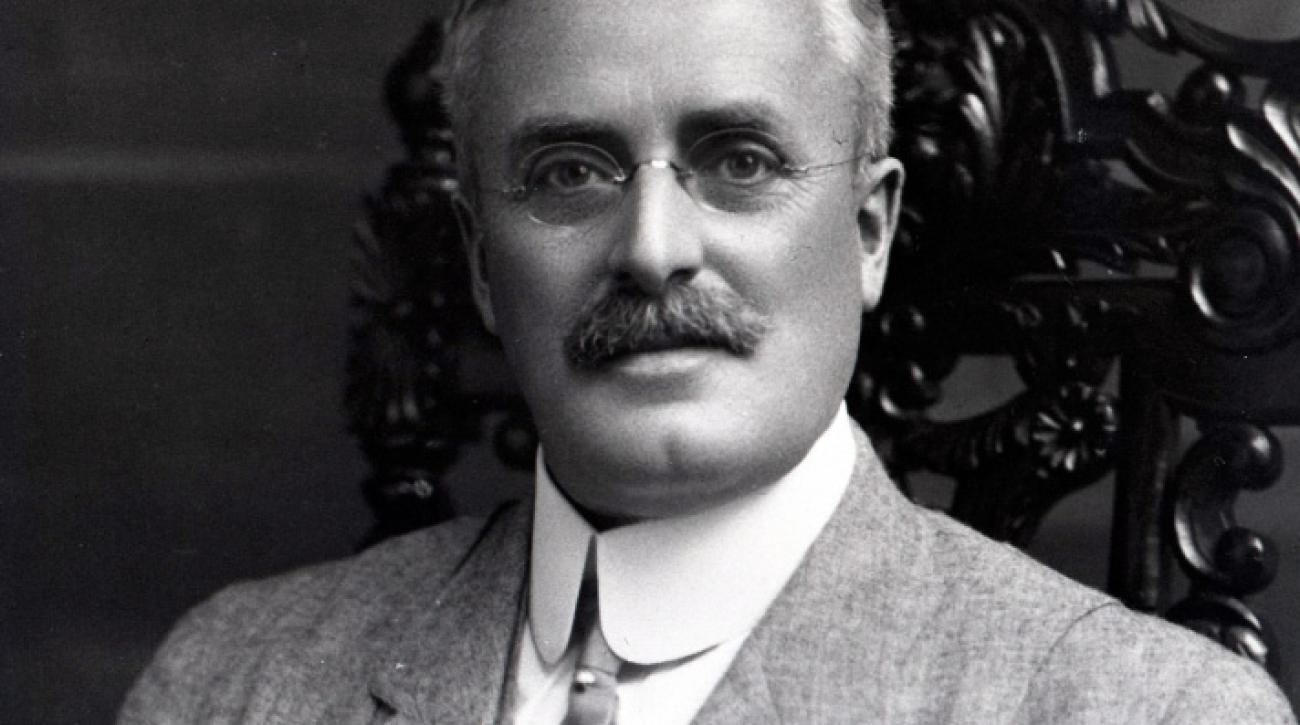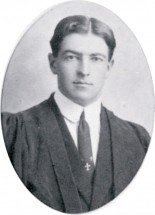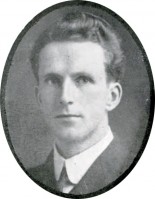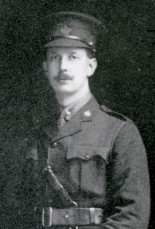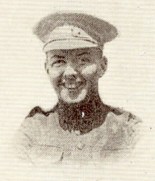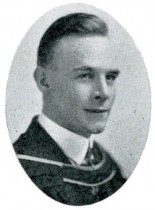Dear Dr. Wesbrook: Letters from the Front
"Conceived in prosperity at the zenith of the world's triumph of invention and luxury, our University has been born at the time of its greatest tragedy."
So reads the opening sentence of a message from UBC’s first president, Frank Wesbrook, published in UBC’s 1916 annual. By the end of the First World War, 697 UBC students had seen active service and 78 lost their lives. At this time the university’s annual enrollment only numbered in the hundreds. Faculty members also served in Europe.
Wesbrook strove to maintain a sense of community during these uncertain years. He proposed that the student publications be used as a central clearing house for news. He made sure UBC soldiers received copies and encouraged them to write letters from Europe for inclusion, believing they would “finally crystallize into an informal record of the early days of the institution.”
Wesbrook sent prompt personal replies to the letters he received, impressing on the student soldiers his desire that they return safely to continue their education at UBC. Dr. Wesbrook died on October 20, 1918, three weeks before the war ended.
Images from McGill College/UBC annuals, courtesy of AMS Archives.
Edward Berry, BA’16
Berry enlisted as a gunner with the 46th Battery in December 1915, and proceeded to England early in 1916. He served in France with the Third Divisional Signal Company on the Somme in 1916, and at Vimy Ridge, Hill 70, and Passchendaele. He was gassed at Loos in 1917. He was invalided to England and on recovery was granted a commission in the Royal Air Force. He was UBC’s first Rhodes Scholar and took up his residence in St John’s College, Oxford, in April 1919. Edward Berry died at Oxford on January 28, 1920, of heart disease resulting from the effects of gas. He was buried In Wolvercote Cemetery, Oxford.
France
January 17/17
Dear Dr. Wesbrook –
I received your Christmas card on the 14th, and am very grateful indeed for the kind wishes which it conveyed.
I must apologize first of all for not having written you before, but we have been rather strenuously engaged during the past few months and correspondence for the most part has gone to the wall. Our unit has been in action periodically ever since we came over, but it was last fall during our two months’ engagement in the “Big Push” that we received our baptism of fire and gained some idea of the destructive effect of a concentrated artillery bombardment.
It is very interesting indeed to be able to watch good artillery fire search out and finally destroy its objective, though occasionally when the Boche guns attempted to demolish our location the shells dropped rather too closely to admit of disinterested observation...
... Just at present we are in a very different position, one which seems even funereal by contrast, and we are glad to be here for it enabled us to celebrate Christmas and New Year’s in the old‑fashioned way. Our Christmas dinner contained such orthodox items as roast turkey and plum pudding, while the tables were loaded with an imposing array of Christmas parcels which had been accumulating for a week beforehand. Only the presence of a little snow was required to make us think we were spending a real Canadian Christmas, but in the absence of that feathery substance a steady downpour of rain, which tried hard to dampen our spirits but failed miserably, was quite sufficient to remind us that we were spending Christmas in France...
Feb. 10‑1917
My dear Mr. Berry:
... We do not feel so very remote from you all nor that our part in the war is quite so vicarious when we hear from you...
... It was good news to hear that all the boys are in good health and doing well. Be sure to urge upon all of them that we are regarding their present experiences as only a phase of their education and training and that we want them all back. To you we look as the first representative of the University to be sent to Oxford. You will have much to do in carrying our message to them and later in bringing back all the good things you can from the Motherland to be applied to our problems here.
Wishing you and all the others continued safety and success and hoping that it may not be long until you are back with us again.
Harry Tremaine Logan
Logan was a professor of classics. He went to France in 1915, where he served in the 72nd Seaforth Highlanders of Canada and the Canadian Machine Gun Corps (CMGC). He became a captain in March 1917 and a major in December 1918. He was awarded the Military Cross. He prepared the official history of the CMGC in 1919 before returning to teaching the following year. He became head of UBC’s Department of Classics in 1949 and went on to write the first published history of UBC, Tuum Est, in 1958. He was still teaching right up until his 80th birthday in 1967.
France
30th April 1917
Dear Dr. Wesbrook –
Every day out here impresses me more and more with the deep meaning of a letter from home...
I have seen a great many of our boys out here and, as I have said more than once before to you, it is always a source of joy and pride to meet them. They almost invariably have received promotion, in most cases they have been promoted to commissioned rank... Smeeton I know from reports to have done exceptionally well in the Vimy Ridge Operation... he is, I believe, now in charge of his Company...
... Do you know, I often imagine my brain will be so long applied to M.G. And Army work that I shall have gotten quite hopelessly behind in Classical knowledge, and yet my two years teaching in the Univ. of B.C. Are among the happiest years of my life and I do feel I could return quite gleefully to that work, if it were not for the thought that my students would suffer from my Latin and Greek being so coated over with rust.
... I am writing this in our Company Advanced Headquarters, situated in a comparatively luxurious dug‑out, until three weeks ago occupied by a Hun company commander. He left in too great a hurry to destroy the furniture of the place, though he found time to break the face of the clock and his mirror. He left us a hat rack, a table, four chairs and a bed, in his sitting‑room and bedroom. In the kitchen a stove, an excellent Carbide lamp, one or two cooking utensils. His dug‑outs are a great asset to our men during this advance...
July 3, 1917
My dear Lieut. Logan:
... Do not worry about getting rusty in classics. It may be a matter of chalk and cheese but what you lose in rust you will more than make up in polish of another kind. All of us stay at home people will lack something for the rest of our lives for which nothing can compensate... I am glad to know that Fritz is such a good provider for himself, especially when you can make him give up his provisions...
Joseph Thomas Smeeton, BA’19
Smeeton was in the Canadian Officer Training Corps from 1914 to 1915. He became a private in the 131st Battalion in December 1915 and a lieutenant in May 1916. He went to Europe in November 1916, serving with the 30th Reserve Battalion in England and the 54th Battalion in France. He was invalided to England in April 1917. His record of service then lists him at the BC Regimental Depot in Seaford (May 1917); with the 16th Reserve (August 1917); and attached to the Royal Flying Corps (November 1917). He returned to Canada and was discharged in January 1919. A 1925 alumni directory lists him as a Presbyterian minister living in Saskatoon.
France
January 5th 1917.
My Dear Dr. Wesbrook,
... My letters... would hardly pass the English test I am afraid, or Mr. Henderson’s literary criticism... One cannot write very coherent letters when one’s nerves are on edge. What with wet, cold, dirt & more dirt & a little more dirt; the guns going boom, boom, boom all day long, eighteen of us living in a dugout, 30 feet by 8 ft by 8 ft & 30 feet underground, & writing by the aid of a single candle, one cannot compile very good letters. We are all happy and cheerful however. I am looking forward to a gala day tomorrow. We have a colonel & a major with us for a few days on a cooks tour. I have my eye on the colonel’s water bottle & intend to have a shave & give my face a sponge bath with the contents thereof. This will indeed be a gala day I can assure you. I would be very grateful if you would have a copy of the Calendar forwarded to me. I should like to look through and fancy myself starting the year again.
January 29‑1917:
My dear Mr. Smeeton:
Your letter of January 5th has just been brought into me. I read it at once and hasten to write you. It is indeed good to hear from the old boys. We think and talk of you all constantly... The calendar for which you ask is being mailed to you...
Guy Moore
While attending university, Moore qualified as a lieutenant in the 11th Regiment, Irish Fusillers of Canada, and secured his captain’s papers in the summer of 1916. He enlisted in December 1916 as a cadet with the Royal Flying Corps and crossed to England in January 1917. After being awarded his pilot’s wings he was made second lieutenant in August 1917, immediately crossing to France to join the 1st Scouting Squadron. He remained with his unit all winter and was promoted to lieutenant and later to captain and flight commander. In March 1918 he was awarded the Military Cross. Captain Moore was killed in action on April 7, 1918, over Ypres and was buried near the spot where he fell. He was officially credited with bringing down 12 enemy planes during his service in France.
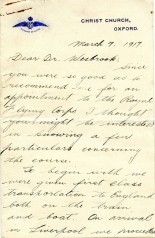 Christ Church, Oxford
Christ Church, Oxford
March 7, 1917
Dear Dr. Wesbrook:
Since you were so good as to recommend me for an appointment to the Royal Flying Corps I thought you might be interested in knowing a few particulars concerning the course... We were lucky enough to be sent to Oxford and yet more lucky to be quartered in Christ Church College where the accommodation is excellent. The first two months are spent in a straight infantry course... the second two months are devoted entirely to the theory of flying, the study of engines, training in the use of machine guns and in the construction of aeroplanes...
March 17‑1917:
My Dear Mr. Moore:
... I sincerely hope that the war may come to a conclusion before you people are available for service. I know this is a wish which you will not endorse and it may even seem unkind to you. There is no way by which we, at this remote distance from the centre of activities, can get any proper basis for arriving at conclusions. The news seems to be good at the present time when both the British and French forces have been so successful in driving the Germans back. One cannot lightly get over the first impressions of the war and to suspect that the Germans are playing some kind of game and have some surprise up their sleeves for us, has become a matter of habit. Surely, however, if they had anything worse, they would have produced it ere this...
France.
Oct. 4. 1917.
Dear Dr. Wesbrook:
... I have been in France, now, for seven weeks, which does not seem long judging by time by ordinary life, but seven weeks in a scout squadron flying over the lines every day entitles one to be considered as an experienced pilot. I am flying a French machine – Nieuport Scout – and curiously enough it is the smallest machine used while I am probably as big a man as any flying today. I like the work very much indeed, and the life is to say the least interesting. I can imagine no game half as fascinating as flying and especially is this so in a scout squadron where seldom do we do two jobs of the same nature in succession. High flying, fourteen to twenty thousand, low flying, “ ground strafing,” fighting and aerial reconnaissance, we do it all...
Arthur Edward Lord, BA’21
Lord became a private in the 196th Battalion in September 1916 and went to England in November. He went to France with the 46th Battalion in February 1917. He was wounded on June 1, 1917, invalided to England in July, and to Canada in March of the following year. He was discharged in April 1918, having attained the rank of corporal, and went on to earn his bachelor’s degree.
France
May 22/17
Dear Mr. Wesbrook –
No doubt you will be surprised to hear from me, but knowing that you always like to hear from your “old boys” whether they be in France or any other part of the globe I am taking this opportunity of writing to you...
... This war of wars still continues, but I don’t think it can last much longer. I think there is no doubt that it is producing a big change in the human race. It is changing the trend of thought. The world is tired of war and those actually participating in it know how truly General Shearman [sic] spoke when he said war was hell.
National disagreements can be and should be settled by wise and fair arbitration, but it will be some time yet before we shall be able to do without armed navies...
Remember me to Mrs. Wesbrook and tell her I hope to be able to dish up some more coffee at UBC next year.
My dear Arthur:
... Our existence out here would be very tame to you after all your experiences...
You are quite right in your remarks on world changes which are now being evolved. I think that even the most imaginative of us cannot predict the full outcome of the present crisis; in fact, no one of us will be able to say just how much he himself will be affected...
Glack Hospital,
Upper Deal, Kent
Oct. 22/17
Dear Dr. Wesbrook –
I was wounded just a week after I sent you that last letter and after spending five weeks in France I was brought over to Blighty and put in a military hospital at Herne Bay, Kent, where I spent a comfortable three months. They thought I was going to be an R.I.P. victim at one time but I upset their calculations and am doing fairly well now...
At the end of my convalescent period I will go before a medical board to be examined. I am hoping for, but not expecting, my discharge. In any case I doubt whether I shall be fit for France again as my wound is in the abdomen and still gives me a little trouble...
... Our boys have done well over there and have proved themselves men under the most trying conditions. Shell fire shows a man up for what he really is and I have never seen any of them show signs of fear or cowardice even under a very severe bombardment. We all long for peace, but of course there is no use of considering it while Germany holds out for such terms as she has hinted at but not definitely stated.
The peace that we want is one which will guarantee that no nation will ever have the presumption to rise like Germany has and make a bid for world domination. At present there is no nation of any importance which is not engaged in this war. If the representatives of these countries do not guarantee peace for all times, this war will have been fought to no advantage. The thing to aim at in the future is closer brotherhood between nations. I think that the great cause for present day conditions is man’s woeful lack of faith in his fellow man...
Nov. 23, 1917
My dear Arthur:
... We were all very much exercised indeed over the news that you had been wounded, which came just about ten days after I wrote you. From the information we got here we were so perturbed that I did not know whether to write you again or not...
I have been impressed not only with your letter but others I have received from our boys at the front, with the evidence of rapid growth and development. You have all become serious‑minded and are thinking deeply about those things which are worthwhile. When you all come back and we can have the combined force and outlook which this war has developed in you and we hope to a lesser degree in ourselves, we shall be able to undo some of the mistakes we have made in the past and to lay some plans for a stable and intelligently organized society which will give each one of us a good chance and will lay special stress on team work. Surely we have drifted long enough and in the future we shall hope to plan our development rather than blunder on...
UBC Archives has recently completed digitization of UBC’s Record of Service for the First World War. View it here: library.ubc.ca/archives/pdfs/misc/record_of_service_WWI.pdf. Read Frank Wesbrook’s diary on Twitter: @Pres_FFWesbrook
























